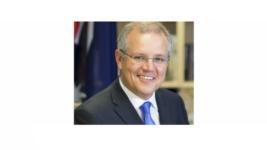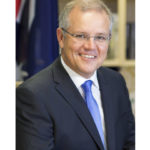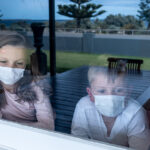Morrison’s Father’s Day Flight: Are We Really All In This Together?

‘We’re all in this together” – it’s a phrase often used by politicians to suggest that everyone is equally affected by the current restrictions on movement and travel, and that each of us has to make sacrifices for the greater good.
But are we really all in this together?
PM’s taxpayer funded flight for Father’s Day
Scott Morrison gave families right around Australia another reason to doubt the political rhetoric, after taking a taxpayer-funded VIP flight from Canberra to Sydney last Friday, and enjoying Father’s Day with his family before flying back to Canberra where he did not isolate in accordance with public health orders which apply to the rest of us.
In a Father’s Day post to his Instagram page on Sunday, Mr Morrison posted a photo with his family which he made clear was taken last year. And the PM’s latest trip may have been kept secret but for news sources picking up on it.
The coverage forced the PM’s office to release an explanatory statement, which made clear Mr Morrison had been granted an exemption for the travel and claimed he could not isolate due to an important meeting which required his personal attendance.
The exemption
Since the COVID-19 outbreak in New South Wales in June, the ACT has strongly advised its residents against travelling into NSW and has required those granted an exemption to undergo a two-week quarantine period.
But ACT chief health officer Kerryn Coleman granted Mr Morrison an exemption subject to a level 3 stay at home order, requiring him to be frequently tested and restricting his movement while in the ACT.
The ACT, like Greater Sydney, is currently in lockdown.
Double standard
Thousands of Australians have been separated from their families as a result of strict travel restrictions, lockdowns and border closures in New South Wales.
Many have been refused their applications for exemptions to visit sick or even dying relatives.
People have lost their jobs and are in financial dire straits, not knowing how to pay their rent or mortgages, businesses have had to close down by the thousands and the mental toll on both adults and children has been enormous.
Families have remained separated, with many not being able to unite on Father’s day to exchange their love and their gifts.
But not our PM – whose Instagram post from last year suggests he didn’t want anyone to know about his VIP getaway.
Politicians are not in this with us
Mr Morrison’s conduct appears to be just the latest example of the political double standards.
Earlier this year, the PM managed to enjoy some recreational time on the back of a trip to the UK for the G7 Summit.
And Queensland Premier Annastacia Palaszczuk was able to travel to Tokyo for the Olympics, enjoying the opening ceremony. She claimed she had to be there for Brisbane’s bid for the 2032 Olympic Games, but many have pointed out that the bid was sure to be successful whether or not she was there as it was the only bid made for the Games.
Treasurer Josh Frydenberg was allowed to travel from Victoria to Canberra to prepare the budget, and Deputy Prime Minister Barnaby Joyce also gained an exemption to enter the ACT despite a lockdown order in Armidale.
Politicians are considered essential workers, but even so, if the rest of us have to manage work commitments via Zoom, so why can’t they?
What’s the big deal?
Politicians have consistently met criticism of their conduct with a blasé, nonchalant and even dismissive or defensive attitude.
It’s an attitude of ‘so what?’, or ‘it’s necessary to do my job’ – but what would these ‘leaders’ say if the millions of Australians currently locked down used these statements to get around the rules?
Eighteen months into the COVID-19 pandemic, it is very clear we are not ‘all in this together.’
Not just because leaders seem to be exempt from the rules, but also because the current incohesive, ad hoc and heavy-handed approach has contributed to the creation of deep divisions in our nation.
The eroding of basic liberties
And then there’s the wholesale removal of basic democratic freedoms, with state leaders steadily raising the bar for when and under what circumstances our liberties will be given back, and what we are required to do in order to have the ‘privilege’ of some freedom.
Freedom for the vaccinated
This week, New South Wales Customer Services Minister Victor Dominello unveiled what the updated Services NSW app would look like when QR code check-ins are linked to a person’s vaccination status.
This follows on from a recent announcement from Gladys Berejiklian that discussions have already begun with industry leaders about how to open up the state safely.
One plan that looks alarmingly like it’s actually coming together is one that will allow only vaccinated New South Wales residents privileges such as going out to pubs and restaurants.
The massive problem with this, of course, is that it amounts to vaccination coercion.
Not ‘anti-vax’; pro-choice
To be clear, this is not an anti-vax debate, it’s a pro-choice debate.
Personal choice is something that democratic nations are founded on. For example, we choose who to vote for, we choose what media to consume, we choose what we do with our own bodies.
In Australia, forcing people to have a medical procedure has until now, been unheard of. And there is a groundswell of concern about this erosion of privacy and civil liberties. Yet, as we have seen in recent months, those who’ve protested about lockdowns, amongst other things, are being punished, rather than being heard.
The question people really need to be asking right now, is where is the peer-reviewed health data that unequivocally recommends mandated vaccinations?
Victoria is currently looking at introducing something similar. Several weeks ago Queensland Premier Annastacia Palaszczuk stopped allowing unvaccinated essential workers to cross the border from NSW. In NSW, several industries have been forced to implement ‘no jab, no job’ policies.
Public at its wit’s end
And yet, in amongst all of the tax-payer funded strategies that have been put in place to manage COVID-19 — the heavy-handed policing, the financial handouts to crippled businesses, the money being poured into domestic violence services, the investment in the mental health sector.
Hospitals, it would appear, have received very little attention, despite the fact that at the start of the pandemic we were told lockdowns and restricting movement were critical components of pandemic management so that we would avoid hospital overload and an ensuing crisis in the healthcare system.
Australians have been largely compliant with public health laws. So it’s important to ask whether our governments have also delivered on their responsibility to adequately equip our hospitals?
Hundreds of nurses around New South Wales have written an open letter to the Premier which would suggest not.
For weeks there have been warnings that if the Delta case numbers continue to rise at significant rates, then New South Wales hospitals may be forced to set up makeshift ICU wards in surgical operating theatres and require staff to care for more than one ICU patient at a time. The letter states:
“It is our professional view that ICUs were in crisis prior to the current Covid-19 pandemic. The added demands of the pandemic, testing capacity and surging admissions are forcing our clinical workforce to the brink, placing our registration at risk on every shift and compromising patient care.”
While there has been some investment in ventilators, as one nurse told the media: “You need trained ICU nurses to manage them. They aren’t like turning on a washing machine.”
Demand for accountability
We must not forget that some of the leaders making these very serious decisions about our health, our personal freedoms and how our tax dollars are being spent to manage the pandemic have already demonstrated that there’s one law for them, and one law for everybody else.
It is a bit reminiscent of George Orwell’s Animal Farm where ‘all animals are equal, but some are more equal than others.’
We urgently need more accountability around the laws and rules that are being introduced, some of which have serious long-term consequences for this country.







